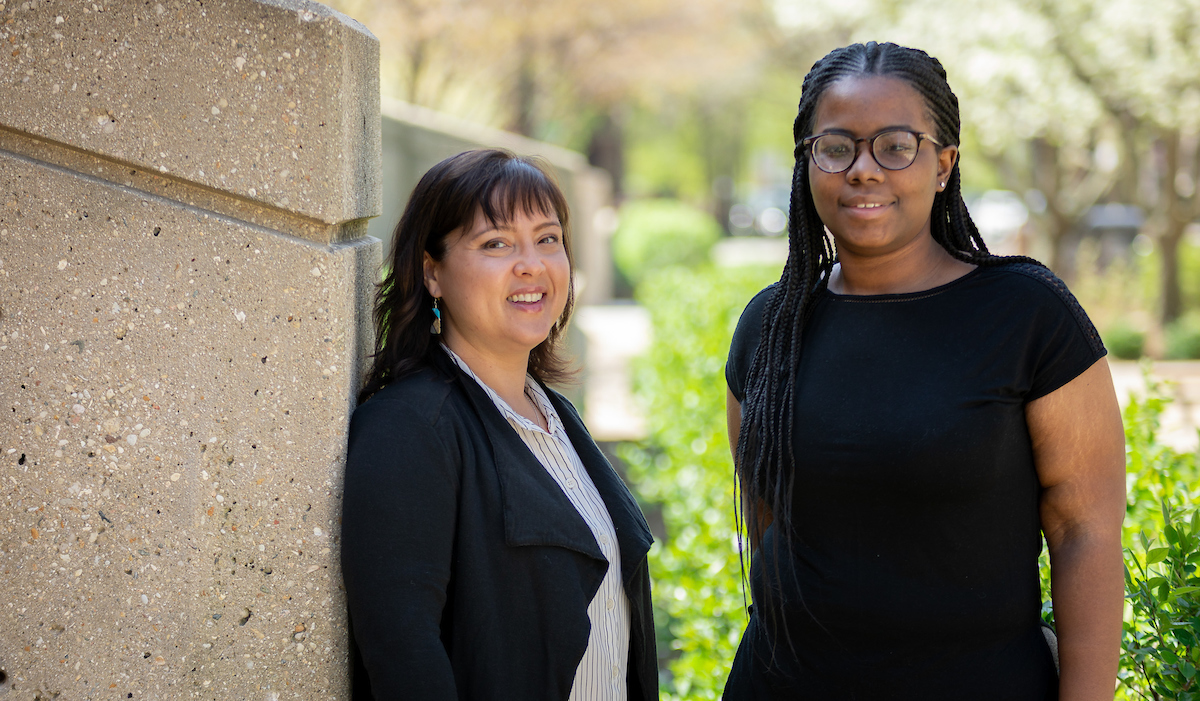 Laura Kina, Vincent DePaul professor in the College of Liberal Arts and Social Sciences, left, and Alexis Beamon, graduate assistant. Kina is the director of the Critical Ethnic Studies MA program and is a visual artist whose research and teaching focuses on Asian American and mixed race history and representation. (DePaul University/Jeff Carrion)
Laura Kina, Vincent DePaul professor in the College of Liberal Arts and Social Sciences, left, and Alexis Beamon, graduate assistant. Kina is the director of the Critical Ethnic Studies MA program and is a visual artist whose research and teaching focuses on Asian American and mixed race history and representation. (DePaul University/Jeff Carrion)
At this year's TEDxDePaulUniversity, Whitney Spencer encouraged the audience to question societal norms with her talk, Reimagining the Intellectual. A first-year graduate student in DePaul's Critical Ethnic Studies program, Spencer highlighted that America's understanding of what it means to be "an intellectual" is limited by preconceived racial stereotypes.
"As a first-generation college graduate, I aim to critique the construction of black intellectual 'lack,' disrupt restrictive ideologies and encourage the intellectual practices of black people," Spencer says. "I'm continuing to explore this work as a CES graduate student at DePaul."
DePaul University's College of Liberal Arts and Social Sciences is among the first in the nation to offer a Master of Arts in Critical Ethnic Studies, which supports the study of such topics by providing an advanced analysis of race and ethnicity. Founded in 2015, the program's second cohort will graduate this June.
With Chicago as a classroom, students like Spencer examine the systematic marginalization of racial minorities within an urban context as well as the global implications of these structures. This includes a look at how groups use art, culture, political organization and other forms of social expression to respond and counter these forces.
"The program is interdisciplinary and intersectional - pulling from existing courses like women's and gender and international studies," says Laura Kina, professor of art, media and design and director of the Critical Ethnic Studies program. "This allows us to look at subjects in a comparative framework."
Kina first noticed DePaul's need and opportunity for such a master's program several years ago. "I helped found the Critical Mixed Race Studies conference at DePaul in 2010, which garnered a lot of attention from the community - so much so that it eventually expanded into its own association," Kina says. "Around 2011, other faculty members and I started crafting the master's program to build upon our existing African America and black Diaspora and Latin American and Latino studies programs."
As it stands, the master's degree requirements include five core courses, a theory/social movement course, a research methods course, four electives and a final project - a thesis, creative portfolio or internship. There are currently 12 students enrolled in the Critical Ethnic Studies Master's program, with more to come in the summer and fall quarters.
"A lot of programs only admit students once every year, but we accept students on a rolling basis," Kina says. "While the program usually takes about two years to complete, Kina notes that students have the ability to move through it at their own pace.
Currently enrolled in the program, graduate assistant Alexis Beamon seeks to broaden her understanding of race, ethnicity and identity before attending law school, where she hopes to focus on human rights and restorative justice.
"CES teaches you how identity affects subjects like health, education and policy," Beamon says. "Within an ever-evolving social climate, the program helps people understand how their identity affects the way they move through the world as well as understand those who may do so differently."